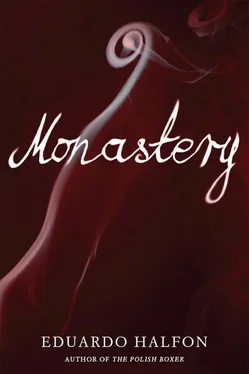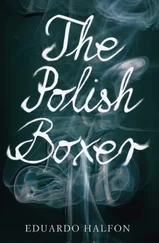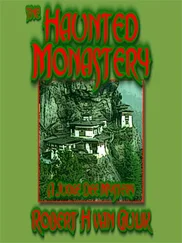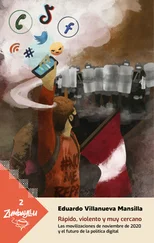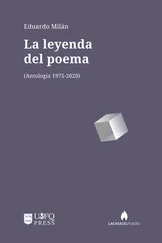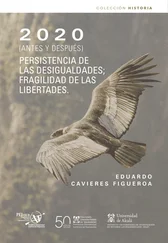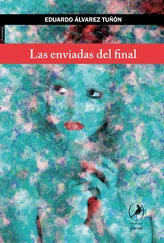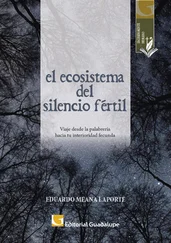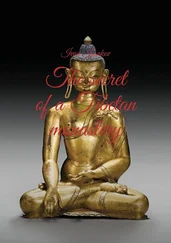AN ITALIAN CAME TO TOWN, Señor Halfon, a charming, handsome man, and he discovered that our coffee here is very high-quality, what they call strictly hard bean, which means intense flavor and very aromatic. He made an offer to the co-op members, to promote our coffee in Italy. We gave him a small sample and he took it to Italy, and after some studies and analyses, he confirmed that indeed, due to the type of soil and the altitude and the local climate, coffee grown here was quality coffee. Then the Italian succeeded in getting Italy to label our coffee premium-quality. A great achievement, Señor Halfon. A gold seal for our co-op. The Italian signed a contract with us and began selling our coffee throughout Italy as luxurious, special, very expensive coffee. He took it to fairs and festivals. He sold it in gourmet shops. The bags of coffee, I remember, came in a very pretty package, which said that part of the profits went to the indigenous of the Guatemalan highlands. His contract with us was for four years. During those four years, the Italian paid the co-op whatever he wanted, far below the internationally quoted price. As co-op members, we had to beg him to pay us what he had offered, what he owed us, but the Italian’s payments were always low, and late. And we never saw the percentage of profits promised on those pretty packages. That’s when Iliana came back. She’d been studying and working in Huehuetenango — When they murdered Osmundo, Doña Ernestina shouted, still from afar, and Don Juan, for a moment, paused, looked down, let out a long loud sigh — and we appointed her director of the co-op. As soon as she started, Iliana discovered that the co-op had just over one dollar in the bank. I’m not exaggerating, Señor Halfon. We were broke. We had an ex-director who stole. We had debts all over. We had an Italian partner who was making millions on the back of our sweat and labor. But little by little, Iliana began to impose order, and she managed to achieve several things. My daughter managed to dissolve the legal partnership we had with the Italian, though it took a lot of work. She got short-term financing for every one of the co-op members. She brought in experts from the capital to teach us how to produce better coffee, and the importance of pruning and thinning a coffee plant, and what the best varieties are, and what the best shade trees are, and why doing a soil study is vital, and how to taste the parchment beans, and how to judge a good cup of coffee. Then Iliana got funding so that every member, on their plots, could build their own wet mills, their own drying patios. She also got funds to build our office and warehouse. She forged an alliance that provided workshops for members on exporting and international commerce. But the most important thing, Señor Halfon, is that she managed to start selling our coffee abroad, our premium-quality coffee, at prices that we ourselves set. Imagine that. Now we set our own prices. This year, for example, when the international price for a quintal of coffee was one hundred and eighty dollars, Iliana managed to sell the co-op’s quintales at two hundred and eighty dollars. Now, at last, we sell our coffee at the price it’s truly worth. Not at the price imposed on us by New York.
DOÑA ERNESTINA RETURNED to the dining room carrying an enormous clay pot full of whole mangoes in hot syrup, and set it on the table. Four years of crops were lost, Iliana said, serving me from the pot with a large metal spoon, four years of hard work and suffering just for the Italian to make a lot of money. The syrup was exquisite. It had clove and cinnamon and a little ground allspice. But I will say, Don Juan declared as he sucked a mango pit with gusto, that thanks to the Italian, Señor Halfon, we got something very valuable. Absolutely, I said, because of him you got the international premium-quality seal, which made your co-op’s coffee one of the most sought-after in the world. Don Juan wiped his lips with a paper napkin. We did, yes, but we also got something even more valuable. The evangelist preacher, in tune to some organ or accordion music, suddenly intoned: May God continue to use you for His glory. Don Juan smiled, perhaps at the evangelist’s euphoric chanting, or perhaps at what he was about to tell me, or perhaps because he was a man whose smile comes naturally and means nothing. The Italian gave us faith in our product, he said. The Italian made us believe in ourselves. And if the price we paid for that was four harvests, well then, Señor Halfon, we got it cheap.
THE BLOCK ACROSS THE STREET from Pensión Peñablanca was onerously defended all night by a loud and territorial street dog. He would bark awhile, then stop barking awhile — just long enough for me to begin to doze off — then start barking again. Close to dawn, I gave up. I threw off the heavy quilt and went to rummage in my backpack for the last of my cigarettes. Smoking faceup on the bed, I watched the objects in the room gradually turn to light, come to life. I couldn’t stop thinking about Don Juan Martínez, about the coffee growers, about Iliana’s work at the co-op, about the pictures and diplomas hanging in the hallway, about the sisters’ silent dance, about the dead brother. And once again I started thinking about my own brother, and my own sister, and our own sibling dance — an ungainly dance, an awkward dance, sometimes even a furious dance. Perhaps because of the cold, or perhaps because of the lack of sleep, all I could think of were our quarrels and fights. The early ones, flailing and hysterical, were typical of spoiled children. The later ones, with my brother, even came to blows (in the last of these, he wound up in the emergency room with a broken foot when he tried to kick me in the stomach and I blocked his kick with my elbow). The adult ones, although still violent, were now waged not with our fists but with our silence. And the most recent one, the hardest and most silent one, had been before my sister’s Orthodox wedding, in Israel.
I showered and dressed slowly. When I went out, I came upon the same dog — big, black, dirty — fast asleep against the wall of a house. I considered waking him up, throwing a rock or a shoe at him. But instead I just walked up the steep cobblestone road, barely managing to sidestep several piles of lukewarm shit.
THE TOWN SLEPT ON. There were almost no pedestrians, or drivers, or buses. Shops and businesses were closed. The buildings all seemed improvised. Cinder-block facades poorly painted in primary colors. Red or grayish corrugated tin roofs. Rusted rebar sticking out of posts and columns for intended second stories. Narrow streets full of rotten fruit, paper, wrappers, plastic bags, boxes, trash from the wandering women vendors at the market the day before.
I came to the central plaza, or what had once been the central plaza and was now a paved soccer field and basketball court, the requisite lines painted on the cement, goals and baskets on either end — one sponsored by NaranJugo, the other by Frutada. I wanted to buy more cigarettes, but everything was closed. I sat down on a bench and just stared at the green of the hills and bluffs around La Libertad, a deep green, alive, the kind only seen in the rainy season. To my left was a row of shops and corner stores; to my right, the police department, painted in grays and blues, with two officers standing outside, smoking, watching me and judging me conspicuously. On the opposite side of the plaza, directly across from me, was the town church: small, gabled, its facade and bell tower painted somewhere between sky blue and bright turquoise. A woman, sitting on the steps leading up to the doors of the church, was arranging her basket to sell tostadas and atol for breakfast. Far from it all, as the backdrop of it all, a thick blanket of fog shrouded half the mountain.

Читать дальше
